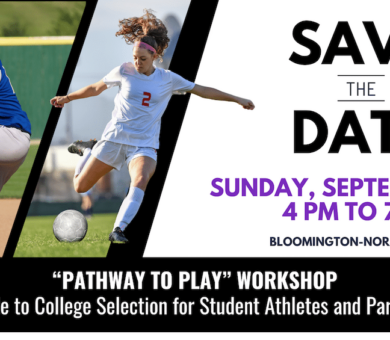Why Start the Recruiting Process Early
Guide: Why Start the Recruiting Process Early
Many parents of former college student athletes confirm that if they had to do it over again, they would have started the recruiting process earlier. What does “earlier” mean? When is the best time to begin the recruiting process?
If your student athlete desires to play college sports, then getting a head start has many advantages. Starting as early as eighth or ninth grade may seem early, but to give your child the best opportunity to find the right college fit, without being pressured at the last minute, is a great approach.
Here are some reasons why starting the recruiting process early can be helpful.
Better Understanding of the Process
Most parents, when they initially begin the recruiting process, are “in the dark” about how to begin, when to begin, and what should be done first. If this is you, don’t worry. You are not alone.
Starting early give you, and your child, more time to ask questions, gain understanding of the overall process, learn the rules, and navigate with more accuracy. Each new piece of knowledge you acquire gives you the opportunity to better assist your child with the recruiting process.
In today’s crazy college selection process, your child is going to need guidance. The recruiting journey is not an easy one. It takes work, dedication, research, knowledge, patience, time and energy. The more understanding you have, and the better guidance you obtain, the better equipped you are to tackle the process.
Learn more about the recruiting process here.
Better Decision-Making
The more time you give yourselves, the better decision-making you’ll enjoy. You’ll have more time to really contemplate what’s important. Your child will have more opportunities for self discovery, and to figure out what they desire in a college experience. For example, in 9th grade, how does your child feel about being away from home? If they have never been away from home, then allowing them to take some trips, without parents, early in high school will help them begin to understand what it truly feels like to be away from home.
How do they feel about big towns, little towns, big schools and little schools? Questions like these can be answered along the recruiting journey, and with accuracy, if they actually participate in discovering the answers. If your student athlete waits until they get recruited, that could be later in high school, and then there is less time to uncover important factors that should be part of the decision-making process when it comes to deciding where to go to college.
Less Pressure
The same holds true for the pressure that comes with the college recruiting process. Pressures come in different forms throughout the entire recruiting journey, but with more time to digest these situations, they are easier to handle.
For example, if there is no college preparation until your child begins to get recruited, and they don’t get recruited until late in their junior or senior year, the amount of time to make decisions gets shorter and shorter, therefore causing pressure to decide important criteria before being ready. That usually means everything gets crammed into a much smaller window. In most cases, there is an increased risk of making mistakes when you have to rush.
What if you don’t know if your student athlete is college material at such a young age? There would be nothing lost if they decided not to play in college, but still found the right college fit. All the self-awareness and decisions around college would still apply. Finding the right college fit should still be a high priority.
More In-Depth Research
If your child dreams of playing college sports, begin to form a list of what seems to be really important to them. What do they like? Dislike? Think of all the different needs your child might have. Then begin to have conversations with your child about what is important.
Next, begin to take your student athlete to different colleges and make those trips fun. Where rules allow it, visit colleges and coaches. Go see games and practices. From these trips, your student athlete will begin to discover more about what they are looking for in a college experience. And it will probably lead to some great conversations that you will enjoy with them.
Begin to make a list of the colleges visited and take great notes about each one. Keep it for use later, when you get deeper into the journey, and the narrowing process begins.
Throughout this time, your child can learn, grow, and freely change their mind about what is important and what is not when it comes to college. They can continue to learn and research before any of the tough decisions have to be made.
This early work can be fun for the student and the parents, as you both learn more and more about each other and about the college selection process.
Tackling Smaller Chunks
The recruiting process is a large and overwhelming entity. Taking on the entire process at once is almost impossible. You and your child need time to process all the information, choices, opportunities and decisions that come with recruiting. Starting early in high school allows you more time to digest it in smaller, doable pieces.
What can be learned before a college coach ever comes calling? A lot. Self awareness is a big one. How can you help your child learn as much as they can about themselves, their wants, and their likes and dislikes. How can you help them without assuming you, and they, already know.
Think of ways you can help guide them, but not decide for them. Let them drive the process. Getting good guidance, especially from companies like Find My Team, who have professional former coaches working with your student athlete, makes all of this work much more enjoyable, focused, fun, and successful.

Allowing More Visits
Taking multiple visits to colleges is an advantage. Every time you step on a campus, you learn something. Many athletes commit to college without ever having stepped foot onto the college campus. Making decisions based on pictures on a website or pamphlets in the mail is a mistake.
The more information you have about each and every college, the better chance of a successful choice. One visit may not be enough. Even if the college is across the country, it would be beneficial to have more than one encounter. This is what makes the early start advantageous. You have more time, and multiple years, to make these visits.
The same holds true for getting to know the college athletes. You can take as many unofficial visits as you want. Most of the time, you can communicate with the college coaches before the unofficial visits, so you have a chance to meet them. You can ask to meet players and maybe watch practices. You can walk around college campuses and take tours through admissions or with coaches. There are many opportunities to get a feel for colleges, and for college campuses, long before having to choose one.
Increasing Success
As with most things, the more you put in, the more you will get out of the recruiting process. There will be some frustrations, setbacks, highs and lows throughout the process. You’ll have to make some adjustments and pivots along the way. There will be preparation, execution and follow up necessary. But at the end of the day, after all of this work, your child will have a better chance to locate, attend, stay, be happy, and graduate from the first college choice.
The bottom line is you don’t have to wait to be invited. You can pursue this journey with your student athlete on your own, whenever you are ready.
Waiting is simply delaying the process, and the time you will have, when it comes down to deadlines and decisions. Give yourselves the time to make a good choice. It will make all the difference.





